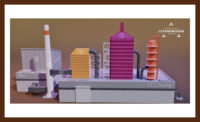Up to 400,000 tonnes a year of carbon dioxide could be captured and stored at what is set to become the world’s first full-scale carbon capture and storage (CCS) facility for cement production following a recent safety and quality certification of the proposed plant in Norway.
If the facility wins government funding, construction could start in January. Building the full-scale CCS system and operating it for five years is estimated to cost $1 billion.
Cement maker Norcem has tested Aker Solutions' carbon capture technology at its Brevik cement production plant for 18 months and now hopes to win government approval following a review this summer by state-owned Gassnova.
Other producers also are pursuing carbon-capture strategies. Lehigh Cement, a unit of global giant HeidelbergCement Group, Heidelberg, Germany, has a feasibility study under way on a full-scale CCS facility at its Edmonton, Alberta, plant that will also explore whether financial sustainability of the appoach.
If the Brevik plant goes ahead, half of the CO2 emissions trapped by the Aker equipment will be shipped to the Norwegian coast, where it will be pumped in a pipeline to a storage well being developed 2,500 m below the North Sea bed at the Troll gas field, some 65 km off Bergen.
In a separate project for Gassnova, the Northern Lights consortium, led by state-controlled Equinor, completed a confirmation CO2 well at the Troll site in March.
Following an 18-month pilot application of the Aker technology at Brevik, the process was certified by the quality assurance company DNV GL.
In the absence of established standards for the novel use of CCS, DNV identified technological risks and mitigation measures and provided “an objective and third-party quality assurance,” says its chief engineer Kristin Berg.
While CCS “is quite well known, the new element is to make it usable for cement plants,” says Per Brevik, Norcem director of sustainability and alternative fuels for northern Europe.
Cement production accounts for about 5% of global CO2 emissions, according to Norcem.





Post a comment to this article
Report Abusive Comment